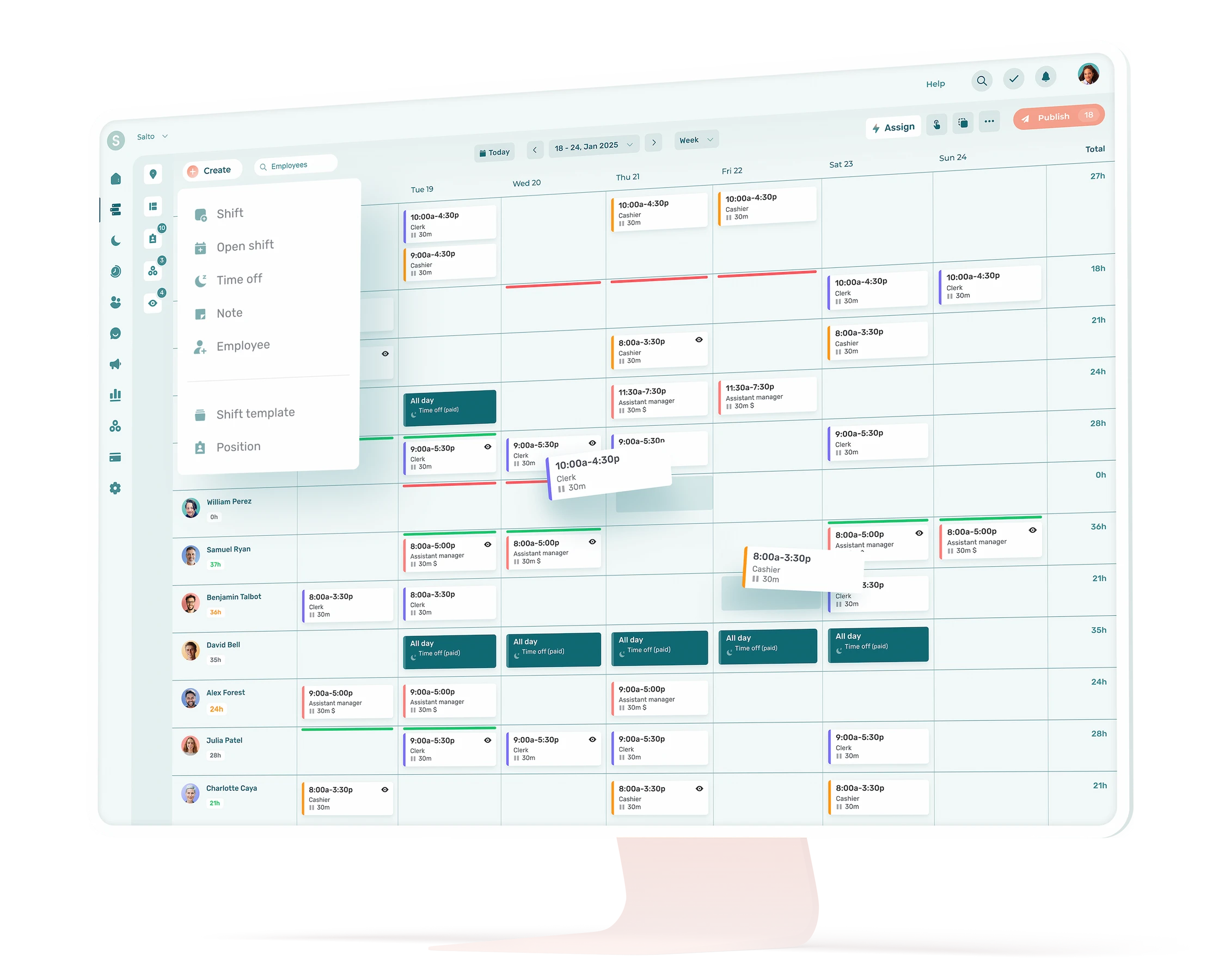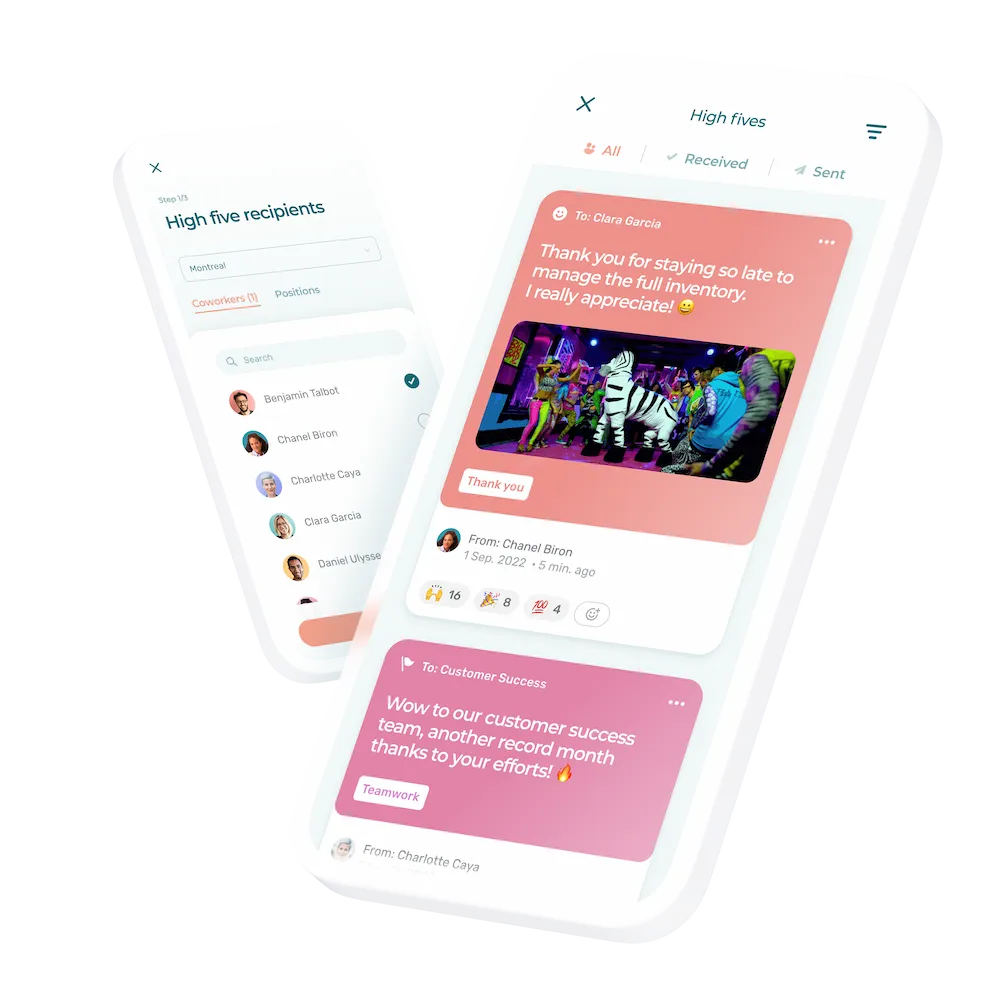Performance reviews are a key instrument for managers looking to develop a culture of continuous improvement at their company.
In addition to motivating the troops and boosting organizational productivity, reviewing your employees’ performance during an evaluation helps foster your team members’ professional development.
Are you all out of ideas for making your evaluations enjoyable and interesting for you and your staff? Now to worry! I’ve compiled 45 questions to ask during your next performance review—organized by topic—along with industry-specific examples.
Work- And Task-Related Questions
The main factors to check up on during a performance review usually have to do with your employees’ work and tasks. After all, these are the heart and soul of your business and success.
Achieving Goals
To go over an employee’s key goals for the evaluation period (month, quarter or half-year):
1. Do you think you’ve reached [name goal]? If so, how?
2. Do you have any specific examples that demonstrate your contribution to our company’s objectives, such as [name an objective]?
3. Were any of your goals over the past few months overly ambitious? What more would you have needed to reach them?
Skills and Results
To highlight your employee’s contribution to the success of your company:
4. What achievement are you most proud of for the evaluation period?
5. What impact do you think your contribution has had on our team’s performance?
6. How have you leveraged your strengths to support the team in recent months?
Examples for a pharmacy
Here are 2 examples of questions tailored more specifically to the realities of pharmacy employees:
7. When dispensing drugs and prescriptions, how do you make sure that orders are accurate?
8. Can you tell me about a time when you had to give a customer important information about a drug?
Challenges to Overcome
Work challenges are normal (and can even be a source of motivation for your employees 🤓), so you might as well address them openly with your team:
9. Have you run into any challenges or obstacles in recent months? Can you tell me how these potentially impacted your performance? How did you handle them?
10. How do you stay cool and collected during emergencies or stressful situations?
11. Have you recently had to set up an emergency procedure (for example, for shoplifting, customer illness or workplace accident) to keep customers or staff safe? How did you go about it?
Areas for Improvement
High-performing teams are the ones who adapt and are good at at continuous improvement:
12. Are there any activities where you feel your performance could have been better? If so, what could you do to improve?
13. Would you need additional training or more support from me to help along your professional development?
14. If you had to pick just one thing you’d like to focus on for the next evaluation period, what would it be?
15. What would you most like to improve, in terms of your technical skills, soft skills or knowledge?
Customer Service
Your employees’ customer service is the backbone of your company’s image and success, so take the time to discuss it during your performance review:
16. How do you prioritize your tasks during a shift, while also making sure to offer the best possible customer service?
17. Can you give me an example of a difficult interaction you had with a customer and how you managed it so that you could maintain service quality and offer a positive experience?
Examples for a hotel
Here are 2 examples of questions that are suitable for hotel employees:
18. How do you make sure that our customers have a pleasant stay? What steps do you take when they voice concerns or issues?
19. How do you manage the more demanding tasks (such as customer check-ins and check-outs) while continuing to effectively handle other requests?
Teamwork-Related Questions
Teamwork can boost staff morale, but it can also undermine it. So, make sure your team is working together smoothly.
Communication
Clear communication is vital for a team to work together, so make sure everyone is on the same page:
20. How would you rate communication and feedback on the team (out of 10)? What could be improved?
21. What could your immediate manager do to improve their communication and feedback?
22. Do you feel comfortable sharing your ideas and concerns with the team?
Examples for a retail store
Here are 3 examples of questions tailored to the realities of retail employees:
23. How do you approach new customers to understand their needs?
24. How do you go about providing shoppers with personalized service?
25. Can you describe a situation where you resolved a customer complaint and managed to turn a negative experience into a positive one?
Working Together
A performance review is an excellent time to check up on collaboration between your team members:
26. What would you say are your main contributions to the team’s success?
27. How do you think your interactions with your colleagues contribute to our success?
28. What could we do to improve collaboration within our department? Between departments?
29. Could your manager offer you more support or resources to make it easier to collaborate with your colleagues?
30. How do you help create a positive team atmosphere?
31. What do you do at work to support your co-workers and help them achieve their goals?
32. Can you tell me about a time when working as a team helped you overcome a challenge?
Examples for healthcare workers
Here are 2 examples of questions for healthcare workers:
33. Can you describe a situation where a patient received more complete care thanks to your effective collaboration with colleagues?
34. How do you manage to stay caring and empathetic when treating patients who are feeling uncomfortable or stressed?
Recognition
Having a company culture focused on recognition helps attract and retain talent. It also ensures that your employees know the value of their contribution to your team:
35. What form of recognition motivates you the most?
36. Do you feel you get enough feedback and recognition from your manager and peers?
37. What could help boost your motivation at work and your commitment to the company?
38. Do you have any ideas for encouraging the team to offer each other more recognition?
Questions About Flexibility and Adaptability
Your company is dynamic and ever-evolving—and so are your employees. So, it’s important to check how things are going, how the team is adapting, and how your company’s current level of flexibility is working out.
Workload and Balance
A performance review is a good occasion to get a read on how your team is doing:
39. Do you feel that your job allows you to balance your work and personal life? How could we make things even easier?
40. How do you cope with unexpected changes at work? For example, when we have a sudden surge of customers or a schedule change?
41. Can you give me an example of how you’ve adapted to a new task or responsibility over the past few months?
Professional Ambitions
Chances are your employees have career ambitions, whether big or small.
The performance review is a perfect time to discuss them together:
42. What are your short- and long-term career goals?
43. How can we help you achieve your career goals?
44. What skills would you like to hone, or what knowledge would you like to develop so you can continue to grow and evolve?
45. Have you considered further training to expand your professional knowledge?
Evaluate, Communicate, Adapt, Evolve
The main purpose of a performance review is to help your team members grow. The more your employees develop and fully tap into their potential, the greater the benefit for your company.
The above questions should help you have rewarding conversations with your employees, better understand their performance, and pinpoint what needs to be improved, on both sides. All of this helps nurture a healthy working environment characterized by open communication.
Finally, don’t forget to focus on constructive feedback!
What is a performance review?
A performance review is a formal discussion between a manager and an employee. During the discussion, the manager gives feedback on the employee’s work and establishes objectives going forward.
The main purpose of a performance review is to provide employees with feedback so they can improve their performance.
How often should performance reviews be done?
Given that the aim of performance reviews is to improve employee performance, they should be held several times a year. A frequency of only one annual evaluation leaves too much time between feedback sessions, making it difficult to follow up on how the employee’s performance is evolving.
While there’s no one ideal frequency that applies to all industries, it’s a good idea to decide on a basic rule of thumb. For example, you can hold performance reviews once per month, quarter, season, etc.
What questions should I ask during a performance review?
The manager may ask the employee a variety of questions during their performance review, for example about:
- Tasks and objectives
- Challenges
- Collaboration and teamwork
- Customer service levels
- Work flexibility
- Work-life balance
- Skill-development opportunities
- Recognition among colleagues
- Communication










